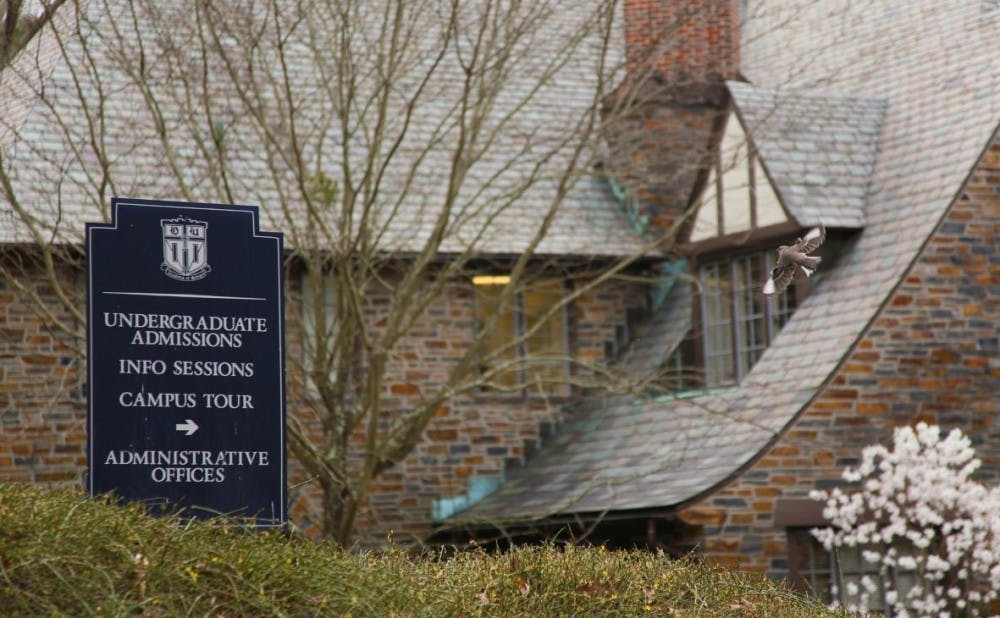High school students seeking admission to Duke don't need to worry about activism affecting their chances, according to a statement issued by the University’s Office of Admissions Monday.
“Duke has always valued active and responsible engagement in civic life among its students and applicants,” the statement said. “We will always consider all applicants fully and individually, and every part of the application, including disciplinary sanctions, in the unique context of the applicants themselves and the values of the institution we represent, which include civic and personal responsibility.”
The statement noted that an "applicant’s participation in peaceful protests" is not justification for Duke to "deny or rescind an offer of admission.”
With this announcement, the University joins a growing list of colleges and universities that have already granted similar assurances to their applicants. After the Feb. 14 school shooting in Parkland, Florida—which left 17 dead and 14 injured—students across the country have lobbied Washington and state governments for tighter gun control by participating in protests, marches and class walkouts. However, threats of disciplinary action have left some would-be student activists wondering whether to take part.
In one Texas school district, for example, the superintendent reportedly threatened to issue three-day suspensions to any student who participates in a class walkout. Other school officials across the country have made similar statements.
By now, more than 170 colleges and universities have released statements explaining that disciplinary action related to peaceful protesting is not likely to affect an applicant’s candidacy. Some schools, like Yale University, went so far as to encourage students to take part in organized walkouts and other forms of peaceful protest.
“Yale will NOT be rescinding anyone’s admission decision for participating in peaceful walkouts for this or other causes, regardless of any high school’s disciplinary policy,” wrote Hannah Mendlowitz, senior assistant director of admissions and director of recruitment, in a blog post. “I, for one, will be cheering these students on from New Haven.”
Christoph Guttentag, Duke’s dean of undergraduate admissions, explained that the Office of Admissions has always considered every part of each application in the context of the individual applicant, and that Monday’s statement represents an extension of existing policy to the particular context of gun control. He said high school students had been reaching out to ask about the impact of peaceful protesting on their applications.
“We wanted to reassure students that if they were sanctioned for peaceful protests we wouldn’t just say, ‘Oh they were suspended, we’re not going to admit them,’" Guttentag wrote in an email. “We’d consider the person and the application as a whole, we’d look at the reason for the sanction, we’d think about the overall contribution the student made to the community and might make at Duke, and we’d put it all in context with everything else in the application.”
Guttentag added that activism is a large part of Duke's culture, so the Office of Admissions has always been open to applicants involved in civic engagement.
“We’ve always had applicants who were active in the public sphere one way or another, including participating in protests, and we like to see students engaged in issues that matter to them,” he wrote. “That sense of engagement is part of what makes Duke the place it is.”
Student reactions to the announcement have been positive. Sophomore Saheel Chodavadia, Duke Student Government’s senator for academic affairs, said that the statement was a great move for Duke.
“The fact that it’s a widely publicized move shows a commitment to cultivating a politically active and engaged class,” Chodavadia wrote in an email. “I hope [the Office of Admissions] continue[s] to be so open-minded and transparent in the future.”
First-year Ryan Williams described the policy as a “giant step forward for both political efficacy and institutional awareness.” He noted that Duke has a responsibility to prepare its students for active citizenship after college, indicating that part of this responsibility is to encourage and enable students to engage with political movements when necessary.
“I applaud Duke for recognizing students’ need to take democracy into their own hands and advocate for change,” Williams wrote in an email. “I think the University made not only the right decision, but the ethically sound decision as well.”
Duke has a history of on-campus student activism, including a 1968 silent vigil lasting longer than a week following the assassination of Martin Luther King Jr. A 1969 sit-in at the Allen Building to attain better treatment for black students resulted in 47 involved students being placed on academic probation by the University. More recently, students held a sit-in at the Allen Building and more students camped outside for several days in 2016 to protest a reported racist incident involving Executive Vice President Tallman Trask.
Get The Chronicle straight to your inbox
Sign up for our weekly newsletter. Cancel at any time.

